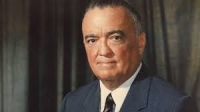J. Edgar Hoover
Country
United States
Birth - Death
1895 - 1972
Occupation
Law
Description
J. Edgar Hoover was the Founding Director and lifetime head of the Federal Bureau of Investigation (FBI), America’s internal security and investigation organization. In this role, he established a reputation as an effective and efficient leader in crime fighting through the use of discipline and morale, but also as a controversial individual who abused his powerful position to his own advantage.
Trained as a lawyer, Hoover joined the U.S. Justice Department on graduation and eventually became the head of its Alien Enemy Bureau investigating illegal aliens to the country. This led to the position as head of its new General Investigations Unit, formed to disrupt any potential internal and dangerous radicals, such as criminal gangs. His unit was renamed the Federal Bureau of Investigation in 1935.
The early years for Hoover in this latter position was focussed primarily in dealing with organized crime that arose from the federally-enacted prohibition laws. Other areas of interest included bank robberies, inter-state murders, gambling, and kidnapping.
To fight these crimes, the FBI under Hoover’s leadership adopted new and progressive policies of administration. These included the country’s first national finger-printing database, establishing the FBI Laboratory to find new ways of analyzing evidence, creating the National Police Academy, and constructing in-depth profiles of individuals considered a risk to the country.
Eventually, Hoover expanded the mandate of the FBI to include those individuals considered subversives, being individuals considered a risk to national political security. This occurred with the establishment of the House Un-American Activities Committee, formed at the request of the FBI, to investigate communists in all fields of American society. The Committee was headed by political zealot Joseph McCarthy. The Cold War of the late 1940s and the 1950s created an atmosphere of deep suspicion in American society directed to any individual who expressed sympathy to communism or left-leaning policies. As part of the FBI’s participation in this, the organization assembled significant files on many individuals containing potentially embarrassing information that could damage their careers. This included information related to any type of LGBTQ behaviour or sympathy.
Both Hoover and the FBI have also been intimately involved in many of the most high profile political events of the 1950s and 1960s. These include the civil rights actions (including the assassination of Martin Luther King Jr.), the assassination of both President John F. Kennedy and Senator Robert Kennedy (whom Hoover disliked intensely), and the Cuban Missile Crisis. Each of these contains some degree of suspicion surrounding the FBI’s activities, motivations, abuse of power, and direct involvement as instigator.
In terms of his personal life, Hoover himself never married. He had a long-time relationship with Clyde Tolson, an Associate Director of the FBI and his heir on his death. Their daily relationship was no secret to Washington insiders. Outside of this, Hoover had no social life. Hoover was meticulous in ensuring no visual or written documentary evidence of the relationship with Tolson was made public. At the time of the relationship, Hoover and the FBI were publicly condemning homosexuality and using such behaviour to wage a public vendetta against many individuals, their careers, and personal lives. However, there is no shortage of contemporaries and confidantes who, subsequent to Hoover’s death, acknowledge the homosexual nature of the relationship with Tolson.
How does one justify the personal practice of LGBTQ behaviour in private while condemning it publicly? It all boils down to the advantages of power and influence and the available mechanisms one has to achieve and exert them. In one sense, this results from the intense pressure placed by society to conform to its social norms in order to achieve these ends. In another, it results from the personal belief that adopting these ends is a symbol of personal success. The irony of the situation is only revealed if its leads to a disastrous outcome. In Hoover’s case, he was able to use the power of the FBI organization and his position as one of the most powerful men in U.S. government to ensure no such outcome was remotely possible during his lifetime.
Subject of a 2011 film 'J. Edgar' written by Dustin Lance Black. Full name is John Edgar Hoover.

